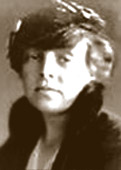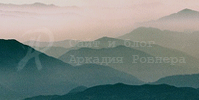Margaret Caroline Anderson

Margaret Caroline Anderson (1886-1973) was born on 24 November 24, 1886 in Indianapolis, Indiana. She started her literary career by reviewing books for magazines. In 1914 she founded the avant-garde literary magazine, The Little Review, of which she was the publisher and chief editor until it closed down in 1929.
This magazine published numerous works by prominent American, English and Irish writers, including Ezra Pound, T.S. Eliot, Hart Crane, Ernest Hemingway, William Butler Yeats, Andre Breton, Jean Cocteau, Carl Sandburg, Gertrude Stein, Wallace Stevens and James Joyce, being the first to publish chapters of the latter’s novel, Ulysses in 1920,on a recommendation by Ezra Pound.
In 1916 she met artist Jane Heap, who became the co-editor of Little Review, and had a major impact on the success of the journal. In 1917 they moved to New York, where the publication of Little Review continued with the support of Ezra Pound, who acted as its foreign editor in London. Anderson became familiar with Gurdjieff’s teachings through Alfred Richard Orage, and after seeing performances of the “Sacred dances”, she moved to France, where she visited at Fontainebleau-Avon.
Anderson and Jane Heap adopted sons of the former’s indisposed sister Louis Peters, Tom and Arthur (‘Fritz’) Peters, whom they brought to Prieuré in June 1924. Anderson subsequently moved back New York and then to the French Riviera, where she wrote a three-volume autobiography and a number of novels. After studying with Gurdjieff briefly in 1924 at his ‘Institute for the Harmonious Development of Man’, she continued studies with him from 1935 to 1949 as part of a group of women known as “The Rope”. She wrote a book of memoirs to him, titled ‘The Unknowable Gurdjieff’. She died on 18 October, 1973.
Quotations from ‘The Unknowable Gurdjieff’:
“When you have finally grasped the meaning of transformation and realized how falsedyour picture of yourself has been, when you have discovered the kind of person you reallyare, and heard (as Maurice Nicoll says) the little song you’ve been singing all your life…this is the moment when you can say you’ve begun from at the beginning.”
“When you went to Gurdjieff to study, only one demand was made upon you — that you work. You weren’t asked to try to change your nature, or give up your business, or ‘enter a monastery’, but seriously to apply yourself to acquiring the three dimensional life Gurdjieff’s knowledge could prepare you for. The ‘work’ had to take first place in your scheme or nothing would be accomplished.”
“Man is born into the captivity of Nature, with his supernatural part passive and hidden from him. With the greatest degree of natural intelligence he can never find anything in himself but mind, feeling, and senses. Only with assistance, instruction and revelation added to faith, the fire of wish and undeviating purpose, can he succeed in being ‘born again.”
“A man may be born an artist — that is, with an art tendency — but he won’t have an art until he has worked at art, developed it through an organic process of growth. He must live a life of Art. In the same way, a man can’t have a soul until he has lived a life of the Soul.”





